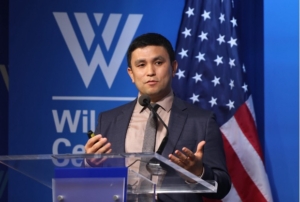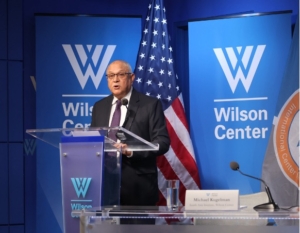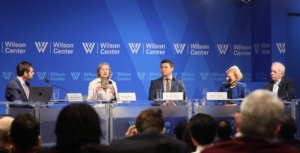 In the intricate dance of geopolitics, water security stands out as a common concern and a potential catalyst for collaboration. Central and South Asia, regions endowed with abundant rivers and basins, face the dual challenges of water scarcity and the impacts of climate change. USAID is working with Central Asia Governments and research institutions—under the Asia Emerging Opportunities (AEO) mechanism—to evaluate the status and possible causes of lower-than-usual regional water supplies. Over the past year, Integra has delivered snowmelt and glacier melt training modules in Central Asia using data from eight primary river basins to continue this work.
In the intricate dance of geopolitics, water security stands out as a common concern and a potential catalyst for collaboration. Central and South Asia, regions endowed with abundant rivers and basins, face the dual challenges of water scarcity and the impacts of climate change. USAID is working with Central Asia Governments and research institutions—under the Asia Emerging Opportunities (AEO) mechanism—to evaluate the status and possible causes of lower-than-usual regional water supplies. Over the past year, Integra has delivered snowmelt and glacier melt training modules in Central Asia using data from eight primary river basins to continue this work.
The Wilson Center, a renowned institution for advancing policy dialogue, partnered with Integra to host an event titled “Water at Wilson: MODSNOW – A New Tool for Water Security in Central and South Asia.” The gathering convened experts and stakeholders to explore innovative solutions to the region’s pressing water challenges.
Kicking off with a warm welcome from Lauren Risi, Program Director of the Environmental Change and Security Program at the Wilson Center, the event proceeded with opening remarks from esteemed representatives, including Änjali Kaur, Deputy Assistant Administrator, Asia Bureau, USAID and Ambassador Sridhar Khatri of Nepal. Deputy Administrator Kaur stated, “We’re proud to have partnered with Integra to develop the simple yet remarkably effective MODSNOW, designed to empower governments and Asian communities to monitor water flows from high mountains. This is critical not only for the immediate needs of the present but also for the long-term sustainability and prosperity of future generations.” Echoing this sentiment, Ambassador Khatri shared that in coordination with Nepal’s ongoing efforts, “the MODSNOW tool developed by Dr. Abror Gafurov, will provide real-time information of water resources and help us to better prepare for disaster response.” Ambassador Baktybek Amanbaev of the Kyrgyz Republic and Ambassador Farrukh Hamralizoda of Tajikistan also spoke about how water security and tools such as MODSNOW are important to their respective countries. These introductory sessions underscored the significance of collaborative efforts in addressing water security issues, setting the stage for a deeper dive into research insights.
 Dr. Abror Gafurov, the Innovative Water & Environmental Solutions (IWES) lead researcher, delivered an informative presentation on MODSNOW, a groundbreaking tool designed to revolutionize water resource management by predicting snowmelt patterns in the Hindu Kush Himalayan region. The subsequent facilitated discussion, expertly moderated by Michael Kugelman, Director of South Asia at the Wilson Center, provided a platform for diverse perspectives and robust dialogue among panelists, including Dr. Eric Rudenshiold, Sherri Goodman, and Mary Melnyk. Audience engagement peaked during the dynamic question-and-answer session, where in-person and online attendees posed thought-provoking queries to the panelists. As the event drew to a close, it left a resonant message of hope and possibility, emphasizing the transformative potential of collaboration and innovation in safeguarding water resources for the future of Central and South Asia.
Dr. Abror Gafurov, the Innovative Water & Environmental Solutions (IWES) lead researcher, delivered an informative presentation on MODSNOW, a groundbreaking tool designed to revolutionize water resource management by predicting snowmelt patterns in the Hindu Kush Himalayan region. The subsequent facilitated discussion, expertly moderated by Michael Kugelman, Director of South Asia at the Wilson Center, provided a platform for diverse perspectives and robust dialogue among panelists, including Dr. Eric Rudenshiold, Sherri Goodman, and Mary Melnyk. Audience engagement peaked during the dynamic question-and-answer session, where in-person and online attendees posed thought-provoking queries to the panelists. As the event drew to a close, it left a resonant message of hope and possibility, emphasizing the transformative potential of collaboration and innovation in safeguarding water resources for the future of Central and South Asia.
At its core, MODSNOW represents a fusion of innovation and necessity. The tool leverages advanced modeling techniques to predict snowmelt patterns in a region, often called the “Water Tower of Asia,” as it is the source of major river systems that sustain millions of people downstream. The significance of MODSNOW lies in its ability to provide timely and accurate information about snowmelt dynamics. By integrating satellite data, climate models, and ground observations, the tool offers policymakers and stakeholders crucial insights into water availability and potential risks. This information is invaluable for devising adaptive strategies to mitigate water-related challenges, such as floods, droughts, and the management of transboundary rivers.

During the event, experts highlighted MODSNOW’s multifaceted benefits. By enhancing the understanding of snowmelt processes, the tool empowers governments to make informed decisions regarding water allocation, infrastructure development, and climate adaptation measures. Furthermore, MODSNOW fosters regional cooperation by facilitating data sharing and collaborative research initiatives, transcending political boundaries to pursue shared water security goals.














































